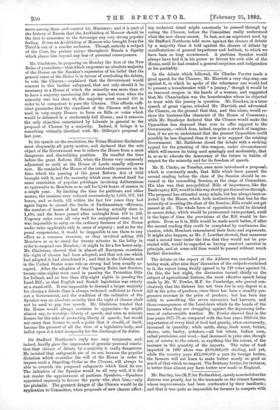In his speech on the resolution, the Prime Minister disclaimed
most eloquently all party motive, and declared that the sole object of the Government was to relieve the House from a most dangerous and discrediting position. He recalled the time before the great Reform Bill, when the House very commonly adjourned as early as the House of Lords usually adjourns now. He reminded the House of the intolerable pressure on its time which the passing of the great Reform Act of 1832 brought with it, and the necessity which soon showed itself for some restriction of popular privileges involving deliberations so oppressive to Members as to call for 1,144 hours of session in a single year. By limiting the time for petitions, and other means, the sessions were reduced successively to 1,056, 957, 943 hours, and so forth, till within the last few years they had again begun to exceed the limits of Parliamentary efficiency, the number of hours of last Session having actually risen to 1,400, and the hours passed after midnight from 100 to 238. Urgency rules were all very well for exceptional cases, but it was impossible to carry on the ordinary business of the House under rules applicable only to cases of urgency ; and as for the penal suspensions, it would be impossible to use them to any effect as a common resource, as they involved asking 300 Members or so to stand for twenty minutes in the lobby in order to suspend one Member,—it might be for a few hours only. Mr. Gladstone showed that in almost all European countries the right of closure had been adopted, and that not one which had adopted it had abandoned it ; and that in the Colonies and in the United States some rule as strong had been usually ac- cepted. After the adoption of the Urgency Rules last Session, twenty-nine nights were used in passing the Protection Bills for Ireland, and no less than fifty-eight nights in passing the Land Bill ; so that English and Scotch legislation was utterly at a stand-still. It was impossible to demand a larger majority for closing a debate than is always reckoned sufficient to throw out a Government, and the condition of the initiative of the Speaker was an absolute security that the right of closure shall not be used to gag free speech. Mr. Gladstone trusted that the House would always continue to appreciate—he might almost say, to worship—liberty of speech, and even to tolerate licence for the sake of protecting liberty of speech; but would not carry that licence to such a point that it should, of itself, become the grossest of all the vices of a legislative body, and inflict upon it a total incapacity for the discharge of its duties.


































 Previous page
Previous page